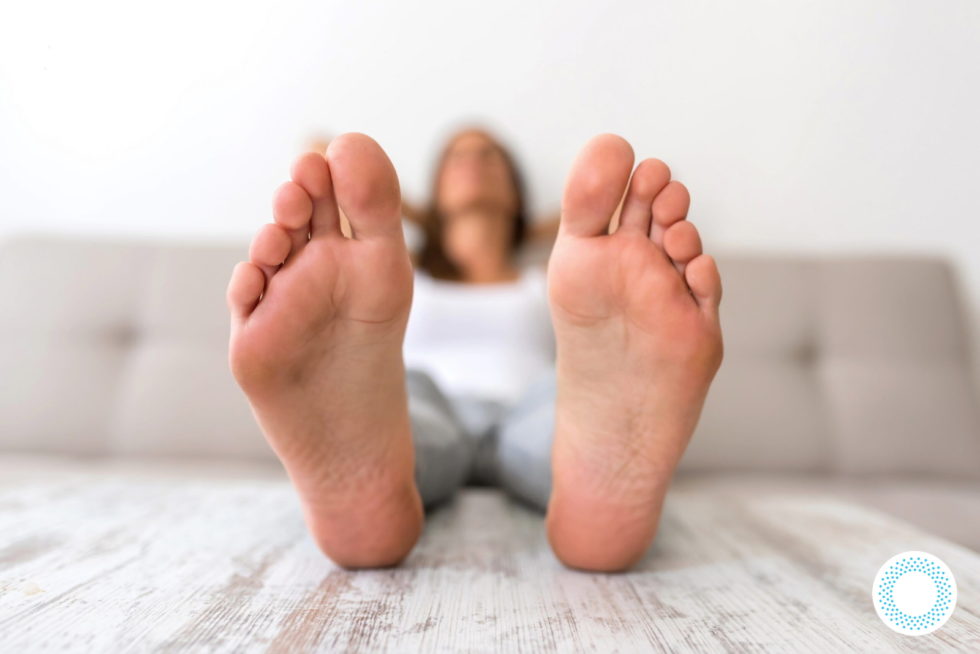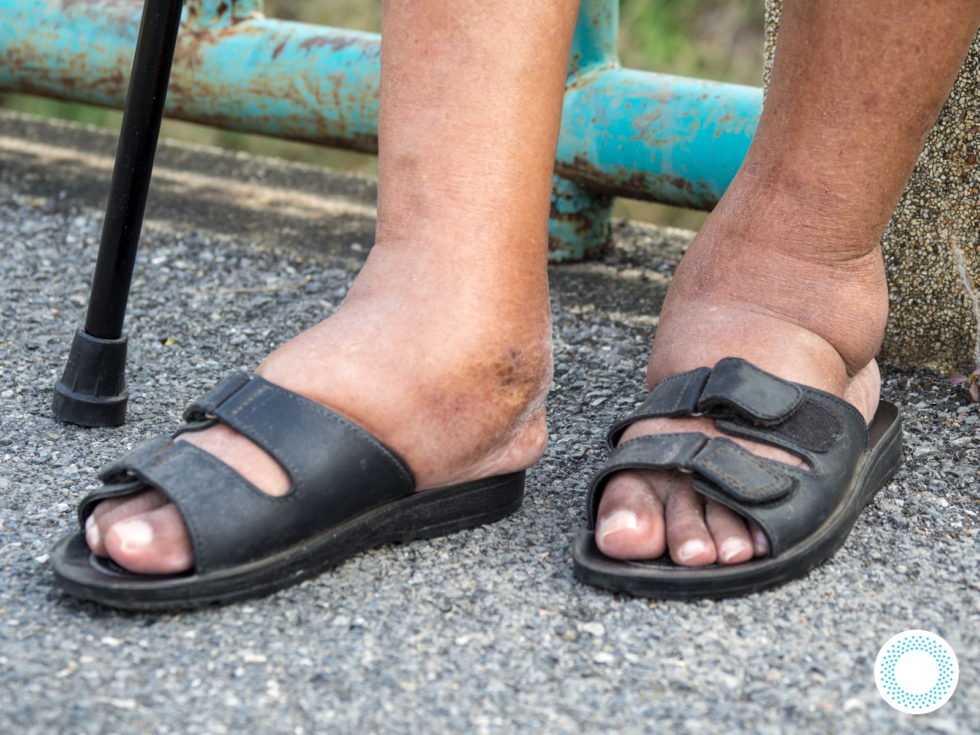Why Are My Feet Swelling? 5 Causes of Swollen Feet
Author: StrideCare Internal Team

It’s not like Bobbi* hasn’t experienced swollen feet before. She was a waitress throughout college and constantly on her feet. She’d even pick up extra shifts when necessary and then go out with friends afterward for a night of clubbing. Needless to say, her feet were often worn out. It wasn’t uncommon to prop her feet up after a long day—even in her 20s—to rest her tired dogs. But that was years ago. Bobbi is a CPA now and not on her feet near as much. And yet, her feet are swollen on and off without any rhyme or reason. Or so she thought.
While it’s true that even the healthiest of us can suffer from temporarily swollen feet and have zero cause for concern, this uncomfortable condition can be a sign of underlying vein disease. This is especially true if your feet and ankles remain swollen or are accompanied by other symptoms. An average of one in every three adults over 45 develops some form of vein disease. If left unchecked, it can cause symptoms like swollen feet, leading to a host of complications affecting a person’s quality of life.
Why Do Our Feet Swell So Often?
Swelling is defined as the enlargement of organs, skin, or other body parts. This is mostly because gravity naturally pulls blood into the veins of your legs, and some of the water in the blood enters the tissues of your legs and feet, causing them to swell. Swelling can occur all over the body or only in one part of the body. Internet searches for ankle swelling and related terms peak during the summer since heat causes blood vessels to expand.
Much of the time—such as with pregnancy, menstruation, side effects from medication, a sprain or strain, injury, recent surgery, fluid retention from too much salt intake, and more—swollen feet are nothing to be concerned about. The swelling will subside quickly, and you can return to normal life.
The same goes for when we are constantly on our feet because of our jobs or active lifestyles. Examples of work and lifestyles where swollen feet are standard include retail and restaurant staff, athletes, construction workers, bank tellers, and assembly line workers.

The problem arises when swollen feet aren’t a temporary annoyance, aren’t caused by the scenarios above, and are accompanied by other painful issues. Swelling can also pop up seemingly without any rhyme or reason. For example, you could be sitting at your computer for 12 hours a day and experience swollen feet and ankles.
Swollen feet are a serious cause for concern if you are experiencing any of the following symptoms.
- Unexplained pain or swelling in your feet and ankles
- Sudden or excessive swelling
- A feeling of heaviness in the affected foot
- Difficulty walking or immobility for long stretches
- Warmth, redness, or inflammation in the affected area
- Swelling that’s accompanied by a fever
- Skin color and texture changes on the feet
5 Potential Causes of Swollen Feet
- Chronic Venous Insufficiency (CVI)
Our veins are a very intricate and interconnected highway that helps blood move throughout our body. As we age, they function less efficiently and can lead to swollen feet. CVI occurs when you don’t have proper blood flowing from the veins in your legs back up to your heart. In addition, a patient may present with broken vein valves that don’t hold a seal. As a result, blood pressure builds up in the lower legs and causes a pooling of blood that leads to swelling and skin changes.
- Edema
More commonly called swelling, edema is a condition caused by fluid retention around the hands, feet, legs, and ankles. It commonly results from varicose veins or damaged and diseased veins in the legs. If your swollen feet are accompanied by numbness and coldness or open sores and ulcers, we recommend you come in for diagnostic tests with our experts as soon as possible.

- Phlebitis
Phlebitis is inflammation that can restrict blood flow in a vein, typically the legs. The vein becomes inflamed because there’s blood clotting inside it or the vein walls are damaged. Symptoms include redness, warmth, pain, and swollen feet. When caused by a blood clot, it’s called thrombophlebitis.
- Liver and Kidney Diseases
Swollen feet can be the first clue that you could have liver or kidney disease. Liver disease causes fluid in the body to pass into tissues and produce swelling in many areas of the body. The same goes for kidney disease. The kidney’s main function is to get rid of excess fluid in the body. When it can’t, a patient can experience fluid retention and swollen feet.
- Deep Vein Thrombosis (DVT)
DVT is a potential life-threatening condition where a blood clot forms inside one of the veins deep within your body, often in the thighs or legs. Swollen legs and feet, foot or leg pain, and burning sensations in the feet are all symptoms. Per the National Blood Clot Alliance, up to 600,000 people in the United States are affected by blood clots each year. In your case, it could start with swollen feet.
If you are experiencing symptoms like the ones above and feel you may have any of these vein issues, it is critical that you visit a vascular expert soon. While there are a variety of treatment options available, the first step would be for the patient to undergo diagnostic vein disease tests to uncover the root cause.
Treatment for Swollen Feet at StrideCare
While swollen feet are a common condition for many people that doesn’t require medical intervention, it is not that way 100% of the time. By treating the underlying causes of your swollen feet—which may be due to vascular diseases—we can give our patients a new lease on life.
The key is not to delay seeking help. Our expert doctors and caring staff at StrideCare utilize the latest technologies and minimally invasive procedures to help our patients with a variety of vein and artery diseases. The vascular physicians at StrideCare are board-certified diagnostic radiologists with additional fellowship training in vascular and interventional radiology. If you need treatment, the experienced physicians at StrideCare will create an individualized plan to help you get the best results.
Prior to starting any new treatment or questions regarding a medical condition, always seek the advice of your doctor or other qualified health provider. This information is not a substitute for professional medical advice.
StrideCare serves the South Texas area including Houston, San Antonio, Austin, Round Rock, Bastrop, Brushy Creek, Cedar Park, Converse, Georgetown, Hutto, Kyle, Leander, Marble Falls, New Braunfels, Pasadena, Pearland, Pflugerville, San Marcos, Schertz, Houston, Sugar Land, Katy, Webster, Bay City, Clear Lake, Lake Jackson, The Woodlands, Universal City, Spring, Kingwood, Stafford, Conroe, Texas City, Cypress, League City, Bellaire, and more.


